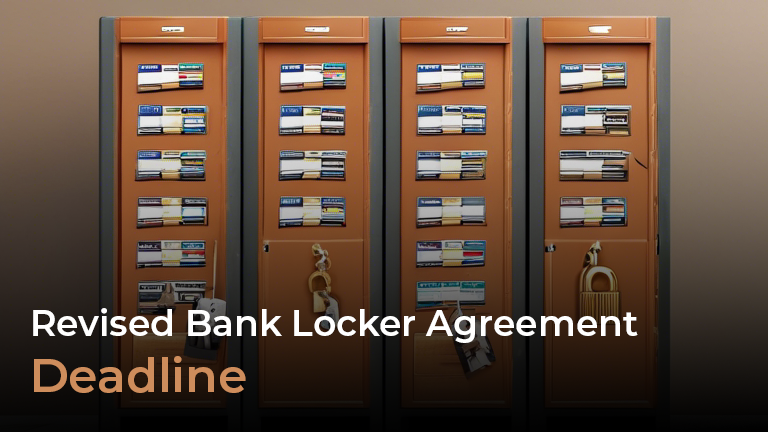Introduction: Revised Bank Locker Agreement
Embark on a journey through the intricacies of banking regulations with our comprehensive guide on the Revised Bank Locker Agreement. In this evolving financial landscape, the deadline extension to December 31, 2023, brings a renewed focus on compliance and understanding the revamped guidelines.

Understanding the Revised Locker Agreement:
The Initial Deadline and Subsequent Extension:
Implementation Guidelines and Staggered Compliance:
Consequences of Non-Compliance:
The circular issued by the RBI in January 2023 underscored the importance of customers completing the renewal process before the revised deadline. Failure to do so could result in banks imposing restrictions, including denying access to lockers and introducing supplementary charges. This added a sense of urgency for customers to ensure their compliance with the new regulations to avoid potential inconveniences.
Unlocking Frozen Lockers:
The circular also addressed the status of lockers that had been frozen due to non-execution of the agreement by the initial deadline of January 1, 2023. The RBI instructed banks to unfreeze such lockers immediately, offering relief to customers who might have faced restrictions on accessing their stored valuables.
Industry Response and Customer Participation:
Reports from various banks indicated varying degrees of customer participation in the agreement renewal process. While some banks, like Union Bank, reported that 80% of their customers had completed the necessary formalities, others, such as Canara Bank, boasted a higher compliance rate of over 90%. Bank of Baroda reported an agreement completion rate of 81%. These numbers shed light on the progress made by the banking sector in achieving the phased compliance targets set by the RBI.
Challenges Faced by Customers:
Despite the extension and phased implementation, challenges persisted for a segment of customers. The Times of India reported that 10-20% of customers were yet to finalize the paperwork. Some banks cited the absence of digital execution options as a potential hurdle, showcasing the need for continuous efforts to streamline the process for the remaining customers.
Conclusion:
As the revised deadline of December 31, 2023, approaches, it is imperative for bank locker holders in India to prioritize the completion of their renewed agreements. The RBI’s phased approach, industry responses, and the potential consequences of non-compliance highlight the significance of aligning with the updated guidelines. Customers are encouraged to engage with their respective banks, utilize available resources, and ensure a seamless transition to the new era of bank locker regulations.
Against the backdrop of the Revised Bank Locker Agreement, customers find themselves at the forefront of a transformative shift in banking practices. The phased compliance approach outlined by the Reserve Bank of India, coupled with industry responses and customer participation, paints a dynamic picture of this transition. As the banking sector strives to meet the stipulated benchmarks by June 30, September 30, and finally by the year-end, it becomes paramount for customers to actively engage with their respective banks. This proactive involvement not only ensures adherence to the new guidelines but also positions individuals to seamlessly navigate the complexities of the revised agreement, safeguarding their assets and preserving the integrity of their banking relationships
Also Read: Should You Invest in Gold in ’24? A Comprehensive Guide

2 thoughts on “Navigating the Revised Bank Locker Agreement Deadline: What You Need to Know”